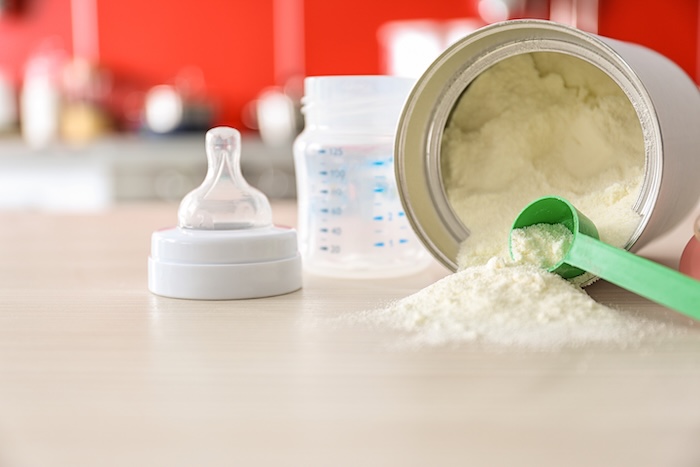Shopping for a baby formula can be one of the most daunting tasks new parents face. After all, you’ve got a huge selection of brands to choose from, near-endless lists of complicated ingredients, plus a variety of different options designed for different infant needs. Luckily, your Orange County pediatric family, Ocean Pediatrics, is here to help. Here’s our helpful guide to choosing the right baby formula for your little one!

Nutritional information
When beginning your search for the best baby formula on the market, you might be tempted to spin each package around and scrutinize every ingredient. But hold on just a minute! The goal of your formula selection should be to find one that most closely mimics the nutritional profile and developmental benefits of natural breast milk (meaning essential nutrients such as DHA, ARA, calcium, iron, and vitamins A, C and D).
However, the fact that all formulas sold in the USA have been FDA approved, you can rest assured knowing that every brand will have what’s necessary for your growing infant. Still, there will be two factors you’ll need to consider when checking ingredients: protein and carbohydrate sources.

Protein sources
Protein in infant formula can be broken into two groups: full-sized and partially hydrolyzed varieties. Full-sized protein sources include cow’s milk and soy-based options — and they usually list their ingredients as ‘nonfat milk’, ‘milk protein isolate’, ‘whey protein’ or ‘soy protein isolate’. Cow’s milk is the most common protein source in formula and perfect for most infants, while soy milk is a great alternative for kids with lactose intolerance or milk-based allergies.
Partially hydrolyzed proteins, on the other hand, are much smaller proteins that have been broken down, closer to the size of those found in natural human breast milk. Formulas in this category tend to be easier to digest, much more expensive, and reserved for infants with digestive issues.
Carbohydrates
By far the most common carbohydrate source in infant formula is lactose. Also found in breast milk, all healthy babies are able to digest lactose just fine. We suggest always starting with a lactose-based formula and seeing how that goes.
But for some premature babies, or those with irritated digestive tracts, a non-lactose based formula may be a better option, such as one made with sucrose or glucose sugars (including corn syrup, corn syrup solids, brown rice syrup, glucose syrup or maltodextrin). Not to fear, the corn syrup mentioned above is NOT the same as the high fructose variety we’re all trying to stay away from.

Formulas for unique circumstances
Reflux
While spitting up is common and usually completely normal, if your little one seems to spit up excessively, you may want to find a formula with a thickening agent to help keep formula down, or partially hydrolyzed protein which is easier to digest.
Baby Eczema
Partially hydrolyzed protein formulas have been shown to alleviate symptoms of baby eczema, so if your little one is showing clear signs, you’ll want to stick with one of those.
Constipation
If you’re dealing with an infant that suffers from constipation, look into getting a formula made without palm oil.
Additional considerations
It seems like every year, baby formula manufacturers are releasing new options for families. Goat milk formulas have increased in popularity as of late, offering benefits such as easier digestion, anti-inflammatory properties, and a protein composition more similar to human breast milk than its cow-based counterpart. On the other hand, organic formulas give parents peace of mind, as they are free from synthetic chemicals and GMOs.

In the end, it’s up to you to choose what works best for your baby. When introducing a new formula to your little one, be sure to do so slowly, offering a mixture of the old with the new, and gradually increasing the amount of the new formula type. You should also observe your child for a few days to make sure they’re handling the transition well.
No matter what you choose, we want you to know that at Ocean Pediatrics, our team of passionate pediatricians are here to help — answering any questions you may have along the way. Book an appointment to get your child the kind and loving care your little ones deserve.
And until then, happy feeding!






